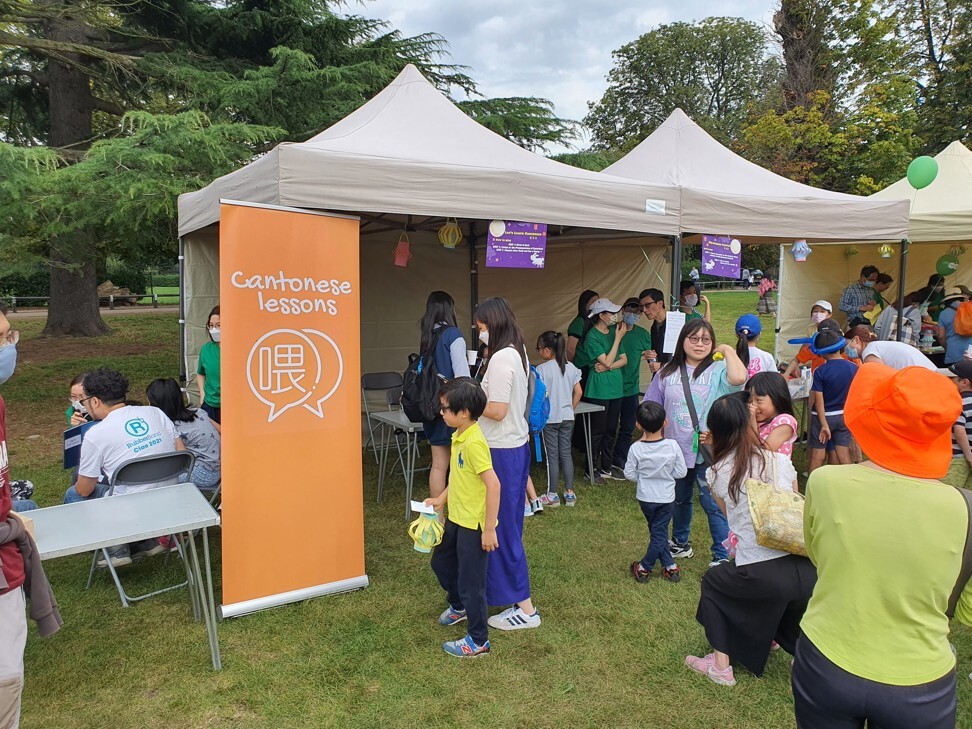
London district holds ‘friendship festival’ to welcome Hong Kong BN(O) immigrants, soothe local worries over influx
- Volunteers rolling out red carpet for new arrivals hope to avoid backlash from local residents
- Large number of new immigrants can spark tension over competition for schools, jobs, experts say
There was Cantonese in the air, a stall selling Hong Kong-style milk tea, and a “Lennon wall” of brightly coloured notes filled with protest slogans and messages that said: “UK welcomes Hongkongers”.
The event last Saturday was held to welcome newcomers from Hong Kong to the London borough of Sutton, with local officials and a member of parliament among the hundreds who turned up.

Since 16 Hong Kong families moved into a block of flats in the area last December, hundreds more have arrived, especially young families. Sutton has proved attractive for its good public schools and being only 30 minutes by train to Central London.
Organisers of last weekend’s event say it was the first of more to come, with another planned in Manchester, which has also been popular with Hong Kong arrivals.
“We have practical things to help them settle in, not just symbolic events,” says one of the organisers, Krish Kandiah, the founder of UKHK, a group that draws on a network of 650 churches to help the new arrivals.
Aside from welcoming the newcomers, the events are also aimed at defusing potential negativity in the community towards an influx of immigrants.

06:15
BN(O) passport holders flee Hong Kong for new life in the UK, fearing Beijing’s tightening control
An estimated 5.4 million of Hong Kong’s 7.5 million residents are eligible for the scheme, which allows successful applicants and their dependents to live, work and study in Britain for up to five years, and apply for citizenship after six years.
Between January 31 and the end of June, about 64,900 Hongkongers applied for the new visas, and 47,300 applications were approved, according to official figures.
Experts predict the migration wave could peak next year, as families need time to plan and arrange their finances before leaving.

‘Help locals understand Hongkongers’
Former Hong Kong media professional David Lau*, 30, who arrived in Sutton with his mother, father and brother in July, said the family uprooted because of the political situation.
They chose Sutton after a friend offered to rent them a house there, and Lau said he was surprised to hear Cantonese spoken in local supermarkets.
He thought last weekend’s festival was a good way to explain Hong Kong culture and allow newcomers to meet members of the local community.
“I had heard about negative feelings surfacing in some cities, such as Manchester, where British people were worried about Hong Kong people coming to Britain and taking resources like education opportunities and jobs, but I haven’t seen that in Sutton,” he says.
Freelance photographer Kate Li*, 39, a British citizen whose parents are from Hong Kong, attended the festival and was surprised by the turnout.
“I never expected to see so many people. It was quite overwhelming,” Li says.

She recalls overhearing a conversation between a festival volunteer and a local white resident, who asked why Hong Kong families were arriving in Britain and moving into the area.
“I think it is important for us in the British community to understand what is going on in Hong Kong. The festival is not just for Hongkongers, but the local community as well,” Li says.
About 100 volunteers from Hong Kong and 50 more from local churches worked together to put on the event.
Nearly 65,000 Hongkongers have applied for BN(O) visa scheme so far
Pastor Hannah Miles, one of the organisers, says the arrival of Hongkongers was not being widely reported in Britain, so there was a need to create awareness in the local community.
“What we want to do is make them welcome, but to do that, you need to educate the people who live in our borough and make them aware,” she says.
“We‘re trying to be proactive rather than reactive. We don’t want it to get to the point where people are resentful of those coming into our community.”

03:01
Hong Kong sees pet exodus as residents flee over Beijing’s tightening grip
In April, the British government started a £43 million (US$59 million) Hong Kong BN(O) integration programme to help new arrivals with housing, jobs and educational support.
Community groups can also apply to use a £2.6 million fund for programmes supporting Hong Kong immigrants. Separate funding is available for services such as helplines and websites for those from Hong Kong, East and Southeast Asia to report hate crimes.
In the first three months of 2020, British police say, there were at least 267 recorded hate crimes against Chinese, East Asian and Southeast Asian people in Britain, compared with 375 in the whole of 2019.
6 months on, how are Hong Kong’s BN(O) families doing and where are they now?
The Sutton Vineyard Church, where Miles is the pastor for children and families, has applied for government funding to provide every school in the area with a lesson or assembly talk on Hongkongers.
These will be geared to children aged seven to nine, the most common age of newly arrived Hong Kong children.
“That will go some way in targeting any aspect of Asian hate crime,” Miles says.
Keen competition for school places
Sutton resident Richard Choi, 39, who arrived from Hong Kong 13 years ago and has lived in the area for eight years, says he was initially worried to see the recent influx of Hongkongers.
The area is predominantly white, with people from India and Pakistan, and previously had relatively few Hong Kong immigrants.
He started a Facebook group last December to reach out to the Hong Kong arrivals, and it now has more than 3,600 members.

It is among dozens of similar Facebook groups where thousands of Hongkongers ask questions about local areas of Britain and share information about schools, housing, transport and more.
Choi, an industrial designer, has met local members of parliament, members of the borough’s school admissions team and local authorities to swap information.
“We know immigrants can be a blessing to a location, but also, if we do not handle it well, their arrival can pose some trouble, so talking to the authorities is very important,” he says.
He adds that, as of the beginning of September, 414 Hong Kong primary and secondary school children have registered in the area’s schools, and with the keen competition for secondary school places, some will be disappointed.
Hong Kong’s BN(O) emigrants unswayed by tax breaks, falling prices
In some Facebook groups, members have advised newcomers not to move to particular cities because of the lack of school places.
“I feel I have a responsibility to let them know the real situation here in Sutton. I am transparent about how many spaces there are in the schools,” he says.
Some still choose to come, and he tells them they should expect that their children will not get into school right away and may have to wait a couple of months.
Sutton Council leader Ruth Dombey, who attended the festival, says the council is helping new residents with school applications.
“I‘m not at all surprised to learn that Sutton is becoming popular for new arrivals from Hong Kong. People have clearly done their research … We have some of the best schools in the country in our borough, lovely green parks and open spaces,” she says, adding the council hopes new residents will invest in the area.

‘A seriously crowded country’
Experts say competition for school places and jobs can cause tension within local communities.
Professor of demography David Coleman, of the department of social policy and intervention at Oxford University, says while the numbers from Hong Kong are still relatively low, the characteristics of the new wave of these immigrants remain to be seen.
“Whatever the merits may be of those that are coming, we have a seriously crowded country, with a serious housing crisis, very considerable pressure on schools, and other problems related to numbers, quite apart from the issue of social integration,” he says.
Britain, Canada, US and Taiwan popular options for Hongkongers leaving city
He adds that integration depends on the attitudes of those who come and the mindset of people in the places where they choose to settle, as well as the numbers.
“To begin with, there’s often an upswell, quite rightfully, of kindness, but it does not always last when problems become apparent,” he says.
“Newcomers may conduct themselves in a very pleasant and integrated way, nonetheless, they are changing the character of the towns into which they come. As more immigrants arrive in Britain, it causes some disquiet.”
However, Kandiah argues that the festival was a way to make a positive case about HongKongers coming to Britain.
“So that’s what we’re trying to do … to let the majority speak and that showed with hundreds of people turning up to celebrate [on Saturday].”
*Names changed at interviewees’ request.

